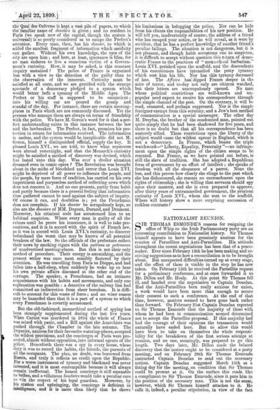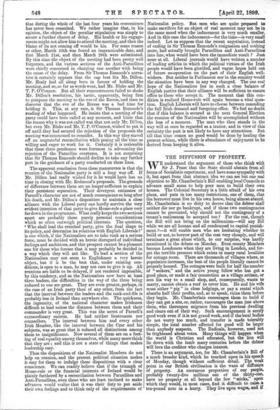NATIONALIST REUNION.
Slit THOMAS ESMONDE'S reasons for resigning the office of Whip to the Irish Parliamentary party are an interesting contribution to Nationalist history. Sir Thomas himself appears to have been genuinely anxious for the reunion of Parnellites and Anti-Parnelhtes. His attitude throughout, the recent negotiations has been that of a peace- maker. Ever since February 13th he has been making and re- ceiving suggestions as to how a reconciliation is to be brought- about. But unexpected difficulties turned up at every stage, and the effect of these is visible in the step he has now taken. On February 13th he received the Parnellite request for a preliminary conference, and at once forwarded it to. Mr. Dillon and Mr. Healy. At this point Sir Thomas fell' ill, and handed over the negotiation to Captain Donelan. Had the Anti-Parnellites been really anxious for union, a week would have been more than enough to secure their consent to such a conference. At the end of that time, however, matters seemed to have gone back rather than forward. On February 21st Captain Donelan reported to Sir Thomas Esmonde that the majority of those with whom he had been in communication seemed determined, not to accept the Parnellite proposal. If this majority had had the courage of their opinions the transaction would naturally have ended here. But to allow this would have been to take 'on themselves the whole responsi- bility for the breakdown of the first serious attempt St reunion, and no one, seemingly, was prepared to go this length. Two days later, Mr. Dillon made the belated discovery that the matter ought to be considered at a party meeting, and on February 28th Sir Thomas Esmonde instructed Captain Donelan to send out the necessary notices. Captain Donelan suggested March 13th as a fitting day for the meeting, on condition that Sir Thomas could be present at it. On the surface this reads like a compliment to Sir Thomas Esmonde, Since it puts him in the position of the necessary man. This is not the sense, however, which Sir Thomas himself attaches to it. He calls it, indeed, a peculiar -stipulation, in view of the -fact that during the whole of the last four years his convenience has never been consulted. We rather imagine that, in his opinion, the object of the peculiar stipulation was simply to secure a further chance of delay. His health or his engage- ments might not allow him to attend the meeting, and then the blame of its not coming off would be his. For some reason or other, March 13th was found an impracticable date, and first March 21st, and then March 28th were substituted. By this time the object of the meeting had been pretty well forgotten, and the various sections of the Anti-Parnellites were chiefly concerned in charging one another with being the cause of the delay. From Sir Thomas Esmonde's narra- tive it certainly appears that the cap best fits Mr. Dillon. Mr. Healy had all along been in favour of holding the meeting, and so, so far as words went, had Mr. Blake and Mr. T. P. O'Connor. But all their remonstrances failed to shake Mr. Dillon's resolution, his tactic, apparently, being first to postpone the meeting to the eve of the Recess 'and then to discover that the eve of the Recess was a bad time for holding it. This, at any rate, is Sir Thomas Esmonde's reading of what happened. He insists that a meeting of the party could have been called at any moment, and hints that the reason why it was not called was that not only Mr. Dillon, but even Mr. Blake and Mr. T. P. O'Connor, wished to put it off until they had secured the rejection of the proposals the meeting was summoned to consider. In this way they staved off an ungrateful reconciliation while posing all the time as willing and eager to work for it. Certainly it is noticeable that these three gentlemen were foremost in advocating the rejection of the Parnellite overtures. It is not surprising that Sir Thomas Esmonde should decline to take any further part in the guidance of a party conducted on these lines.
The apparent conclusion from these manceuvres is that the reunion of the Nationalist party is still a long way off. If Mr. Dillon had really wished for it he would have lost no time in closing with Mr. Redmond's proposals. The grounds of difference between them are no longer sufficient to explain their persistent separation. Their divergent estimates of Parnell's character are not of much consequence so long after his death, and Mr. Dillon's disposition to maintain a close alliance with the Liberal party can hardly survive the very evident intention of that party to give Home-rule a place very far down in the programme. What really keeps the two sections apart are probably those purely personal considerations which so often outweigh political interests. The question, Who shall lead the reunited party, give the final shape to its policy, and determine its relations with English Liberals?' is one which, if the Nationalists are to take rank as a serious force, must be decided with an heroic disregard of individual feelings and ambitions, and this prospect cannot be a pleasant one for those who foresee that it may probably be decided in a way which they will not like. To lead a section of the Nationalists may not seem to Englishmen a very heroic object, but if it be the best that, under existing con- ditions, is open to a man, he may not care to give it up. All reunions are liable to be delayed, if not rendered impossible, by this tendency, and as the Nationalists now have at least three leaders, the difficulties in the way of the three being reduced to one are great. They are even greater, perhaps, in the case of an Irish party than of any other, from the fact that the interval between the leaders and the rank-and-file is probably less in Ireland than anywhere else. The quickness, the ingenuity, of the national character makes Irishmen difficult to lead unless the distance between them and their commander is very great. This was the secret of Parnell's extraordinary success. He had neither lieutenants nor counsellors. The interval between him and every other Irish Member, like the interval between the Czar and his subjects, was so great that it reduced all distinctions among them to insignificance. Now several of them are on a foot- ing of real equality among themselves, while many more think that they are ; and this is not a state of things that makes leadership easy.
,Thus the dispositions of the Nationalist Members do not help on reunion, and the present political situation makes it easy for them to indulge these dispositions with a clear conscience. We can readily believe that if the triumph of Home-rule or the financial interests of Ireland would be plainly furthered by a reconciliation between Parnellites and Anti-Parnellites, even those who are least inclined to make advances would realise that it was their duty to put aside their own feelings and to think only of the requirements of Nationalist policy. But men who are quite prepared to make sacrifices for an object of real moment may not be in the same mood when the inducement is very Much smaller. And in this case the inducement—for the time—is very 61311 indeed. Let us suppose that the recent negotiation, instead of ending in Sir Thomas Esmonde's resignation. and nothing more, had actually brought Parnellites and Anti-Parnellites into line, what would have been the immediate result ? Just none at all. Liberal journals would have written a numbei of leading articles in which the political virtues of the Irish people would have been glorified, and vague hopm held out of future co-operation on the part of their English well- wishers. But neither in Parliament nor in the country would the situation have been in any way changed. The one real hope of the Nationalists lies in such a close balance of English parties that their affiance will be sufficient to ensure office to those who accept it. The moment that this con- dition is realised Home-rule will again become a vital ques- tion. English Liberals will have to choose between conceding the full Irish demand and foregoing office. We feel no doubt that if this balance is secured at the next General Election the reunion of the Nationalists will be accomplished without the loss of a moment. The man who then stands in the way will at once be regarded as a traitor, and in view of this certainty the part is not likely to have any attractions. 13ut till that time comes no good would be done by healing the present schism, while there is abundance of enjoyment to he derived from keeping it alive.







































 Previous page
Previous page